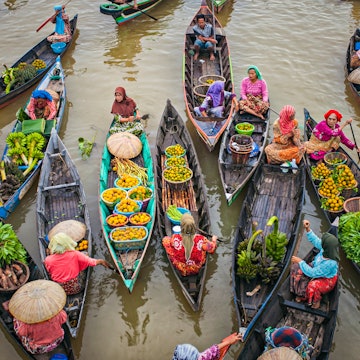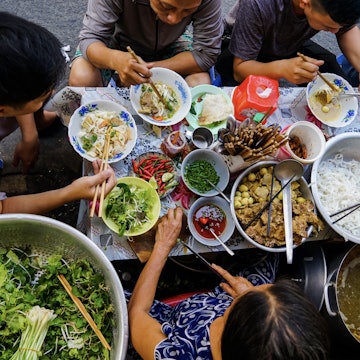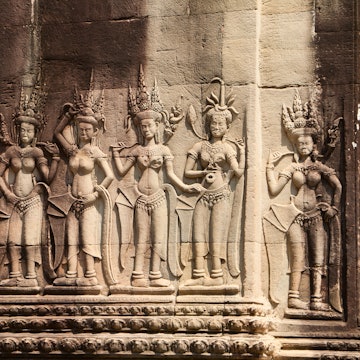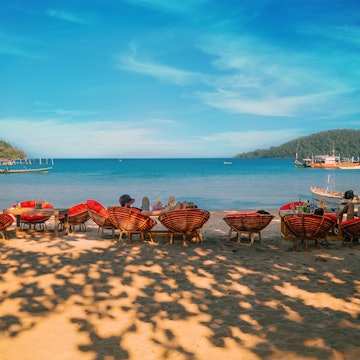

Hotel De La Paix in Siem Reap where art deco is merged with traditional Khmer design ©Felix Hug/Lonely Planet
The Temples of Angkor Wat are an iconic symbol of Southeast Asia and rightly Cambodia's top attraction. But Siem Reap, gateway to Angkor, offers much more than its famed temples. The city is an emerging center of commerce and culture in the Mekong region. Now that the country has relaxed its requirements for vaccinated visitors to quarantine, more travelers are planning a trip to Cambodia.
If you are lucky enough to make it there in 2022, once your extra-early sunrise tour of Angkor Wat is complete, we've got the best things to do in Siem Reap. From helicopter tours and ziplining to joining the circus, there's plenty to keep travelers active. Here are our favorites.

Helicopter flights for the best views
Once you've seen the glorious temple grounds by foot, take to the skies in a helicopter with Smiles of Angkor. But this is a list of things to do beyond the major temple draw; opt for one of the helicopter tours that go further, including trips to stunning aerials of the Phnom Koulen waterfall and the floating villages of Tonlé Sap lake. Longer flight options include seeing all the major temples, and a ‘see it all’ flight for 40 minutes which includes the ornate Banteay Srei temple.
Quad-biking tours
Explore the beautiful Siem Reap countryside by all-terrain vehicle (ATV) on a sunset tour through the rice fields with Quad Adventure Cambodia. If you thought quad bikes were only for petrol heads, think again – here they are perfect for negotiating the dirt roads, and local children greet you like a rock star as you ride slowly through the villages. Longer rides go deep into the Cambodian countryside and include a stop at some remote, seldom-visited temples.
Siem Reap by Vespa
Four wheels bad, two wheels good? Then try buzzing around Siem Reap on a Vespa, the classic Italian scooter. Cambodia Vespa Adventures takes visitors deep into the rice fields to engage with the local people on an all-day Countryside Life Tour. Or spend the evening tasting Cambodian cuisine around Siem Reap on the After Dark Foodie Tour.
Horse-riding trails
Choose a different sort of horsepower altogether and opt for a four-legged ride through fields and quiet villages. The Happy Ranch offers one- to four-hour trail rides taking in the Cambodian scenery, visiting some beautiful off-the-beaten-path spots. Some obscure temples are included in the longer rides, such as Wat Chedi, an old pagoda sitting imperiously above a sea of emerald-green rice fields.

Cooking classes and tuk tuks
If managing a quad bike sounds a little daunting, let a driver take the strain and join a Cooks in Tuk Tuks culinary class to discover the best of Cambodian cooking. Start out with a visit to the local market, by tuk-tuk, of course, to learn some bargaining skills while helping purchase the fresh ingredients for the class. Dishes include a banana-flower salad starter, the national dish of fish amok and a sago, pumpkin and coconut milk dessert.
Phare, the Cambodian circus
This innovative contemporary Cambodian circus comes to town every night, thanks to a traditional big-top home behind the Angkor National Museum. Modern morality tales meet traditional circus skills of acrobatics, contortion and juggling to create a memorable evening. Many of the young-adult performers come from under-privileged backgrounds in Battambang and Siem Reap and have gone on to entertain audiences worldwide.

Ziplining among the gibbons
Go ape on a jungle-canopy zipline adventure that offers the opportunity to glimpse some gibbons in their natural habitat. Angkor Zipline operates 10 ziplines linked together by wooden bridges. The highest point of the course reaches 50m, with views as far north as the holy mountain of Phnom Kulen. The safety standards here are world-class: a monkey business without the monkeying around.
Miniature-golfing the temples
While the serious golfers make for the Nick Faldo–designed Angkor Golf Resort, mini-golf fans prefer to fine-tune their putting skills at the Angkor Wat Putt. Most of the 14 holes are designed as Angkor temples, including petite Banteay Srei and mountain-top Prasat Preah Vihear. Pint-sized replicas are one way to ensure that children can enjoy the temples without getting tired, and adults win a free beer for a hole-in-one.

Shopping for a cause
For socially responsible shopping at its most sophisticated, tour the extensive workshops of Artisans d’Angkor. Here you can learn how the enterprise has helped reinvigorate the handicraft industries of Siem Reap, which were devastated by the long years of civil war. Visitors are guided to watch students recreating Angkorian sculpture from stone, painting fine lacquer and producing intricate silverware. The onsite gallery is a stunning showcase of the students’ skills and the stylish souvenirs offer a sustainable choice to shopaholics.
Cambodia’s landmine legacy
After three decades of civil war and conflict, landmines litter the landscape in Cambodia. Aki Ra has dedicated his life to clearing the country of these enemies within. From the early days of DIY clearance with primitive tools, Aki Ra now runs a fully-fledged demining organization equipped with state-of-the-art technology. Learn more about the legacy of landmines at the informative Cambodia Landmine Museum and discover why Aki Ra was chosen by CNN as one of their heroes.

See Cambodian wildlife
For a close-up look at Cambodia’s threatened wildlife, take a trip to the Angkor Centre for Conservation of Biodiversity. Located at the foot of the holy river of Kbal Spean, the ACCB is home to native primates such as the pileated gibbon, silvered langur and the nocturnal slow loris. Tour the center with a wildlife expert and you may even glimpse the shy pangolins, scaly armadillo-like creatures that are hunted for medicinal use in the region.
You might also like:
An insider's guide to Phnom Penh, Southeast Asia’s new capital of cool
Caving, diving, trekking and more: finding adventure in Cambodia
Angkor Wat: get to know Cambodia's most iconic temple














